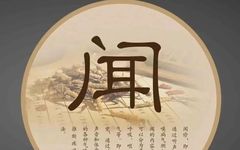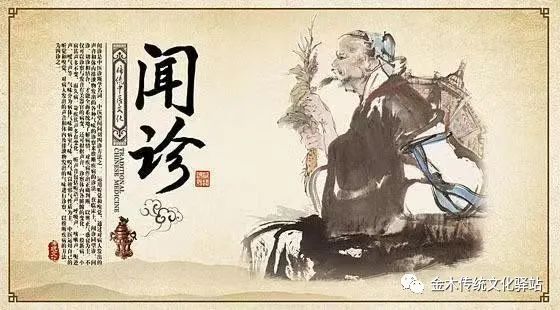
To know by listening is called sage.
Normal voice: natural, harmonious, free, words match intention.
High, strong voice, light in front and heavy in back 【Yang syndrome, excess syndrome, heat syndrome】
Low, weak voice, heavy in front and light in back 【Deficiency syndrome, cold syndrome】
Section One: Listening to Sounds
(1) Abnormal Voice
1. Muffled voice, heavy, nasal congestion 【Common in external invasion of wind-cold, dampness】
2. Hoarseness and loss of voice
Hoarseness: raspy voice
Loss of voice: complete absence of sound
Metal fails to sound — external pathogens invade the lungs or phlegm-damp obstructs the lungs — excess syndrome leads to loss of lung clarity, pathogens block the orifices.
Metal breaks silence — essence and qi internally injured, lung and kidney yin deficiency — deficiency syndrome leads to yin deficiency and excess fire, internal injury of lung and kidney essence.
Metal — lung metal
3. Snoring: snoring during sleep — phlegm and qi obstructing, phlegm rising and falling with qi 【Regulate qi and transform phlegm】
Comatose patients snoring belong to critical condition.
4. Sighing: deep sighing
Frequent sighing — liver qi stagnation 【Soothe liver and regulate qi】
5. Exclamations: startled cries
Startled cries during sleep — childhood convulsions.
(2) Abnormal Speech
1. Delirium: unclear consciousness, incoherent speech, disordered words, loud and forceful voice 【Fire disturbing the heart spirit, blood stasis】
2. Repetitive speech: unclear consciousness, repetitive language, intermittent and weak speech 【Severe heart qi injury, scattered spirit】 seen in late stages of various diseases, critical phases.
3. Weak voice: body weakness, low voice, intermittent, slow speed.
4. Mumbled speech: unclear speech, most common in stroke patients, speaking without an audience.
5. Talking to oneself: refers to self-talk, incessant, stopping when others speak. Symptoms of disjointedness. Often due to weak heart qi, insufficient spirit, or qi stagnation and phlegm obstruction, clouding the heart spirit, belonging to yin syndrome. Common in manic speech and depression.
6. Confused speech: disordered speech, realizing mistakes after speaking, due to insufficient heart qi, loss of nourishment 【Heart blood deficiency】
7. Wild speech: coarse language, shouting and cursing, singing loudly, running away. Restless and irrational 【Phlegm-fire disturbing the heart, manic disorder】
(3) Abnormal Breathing
1. Wheezing (asthma): difficulty breathing, even opening mouth and raising shoulders, flaring nostrils.
-
Excess wheezing: loud and forceful, quick to exhale, wind-cold, heat, phlegm-damp.
-
Deficiency wheezing: low and weak voice, quick to inhale, lung and kidney qi deficiency.
2. Asthma: rapid breathing resembling wheezing, with a wheezing sound in the throat.
Often caused by hidden phlegm-damp, triggered by external pathogens, or due to prolonged stay in cold and damp places, or excessive consumption of sour, salty, and cold foods.
Wheezing does not accompany asthma, but asthma must accompany wheezing, with wheezing characterized by urgent breath and difficulty breathing, while asthma is characterized by wheezing sounds in the throat.
3. Shortness of breath: rapid breathing unable to continue, resembling wheezing but without shoulder elevation. Breath is urgent without phlegm sound 【Lung qi deficiency】
4. Shallow breathing: weak breath, low voice.
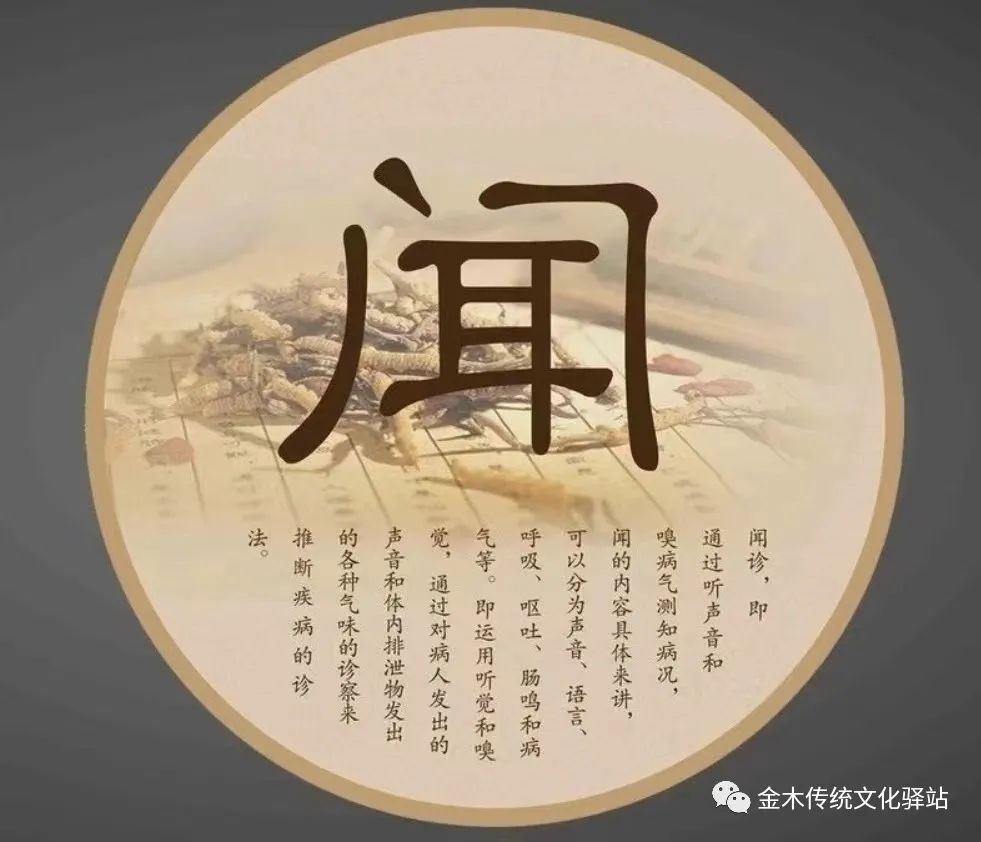
(4) Coughing
Air rises to the throat, sound passage closes.
Whooping cough — paroxysmal cough, continuous coughing, with a crowing sound after coughing, caused by wind pathogens and phlegm binding, stagnating and transforming into heat, commonly seen in children.
Diphtheria — cough sounds like a dog barking, caused by epidemic toxins attacking the throat.
Coughing is not limited to the lungs; all organs can cause coughing, not just the lungs.
(5) Vomiting
Loud — excess syndrome
Low — deficiency syndrome
High-pitched — heat syndrome
Dull — cold syndrome
Frequent — excess syndrome
Infrequent — deficiency syndrome
Yellow, foul — excess syndrome
White, odorless — cold syndrome
High fever: head trauma can cause projectile vomiting, stiff neck.
Food accumulation: vomit may have sour, rotten smell, stool foul like rotten eggs.
Stomach reflux: morning food vomited in the evening, evening food vomited in the morning 【Spleen and stomach yang deficiency; phlegm-damp and blood stasis obstruction】.
Water reversal: dry mouth, easy to drink, water stops in the stomach, water enters and immediately vomits.
(6) Hiccups
Stomach qi reverses, disease located in the stomach and lungs.
(7) Belching
Belching, qi stagnation
Liver qi invading the stomach
(8) Sighing
Deep sighing, frequent sighing. Emotional repression.
(9) Sneezing
(10) Bowel sounds
Qi stagnation, qi over water sound.
Liver qi stagnation affecting spleen and stomach or intestines.
Cold damp causing qi mechanism obstruction.
Spleen and lung qi deficiency, weak peristalsis, lungs and large intestine are interrelated.
Section Two: Smelling Odors
Odor of the diseased body
Odor of the sickroom
Odor of excretions
1. Distinguish cold, heat, deficiency, and excess, sour, rotten, foul smell — excess syndrome; faint smell, slightly fishy — deficiency syndrome, cold syndrome.
2. Special odors
3. Odor of the sickroom
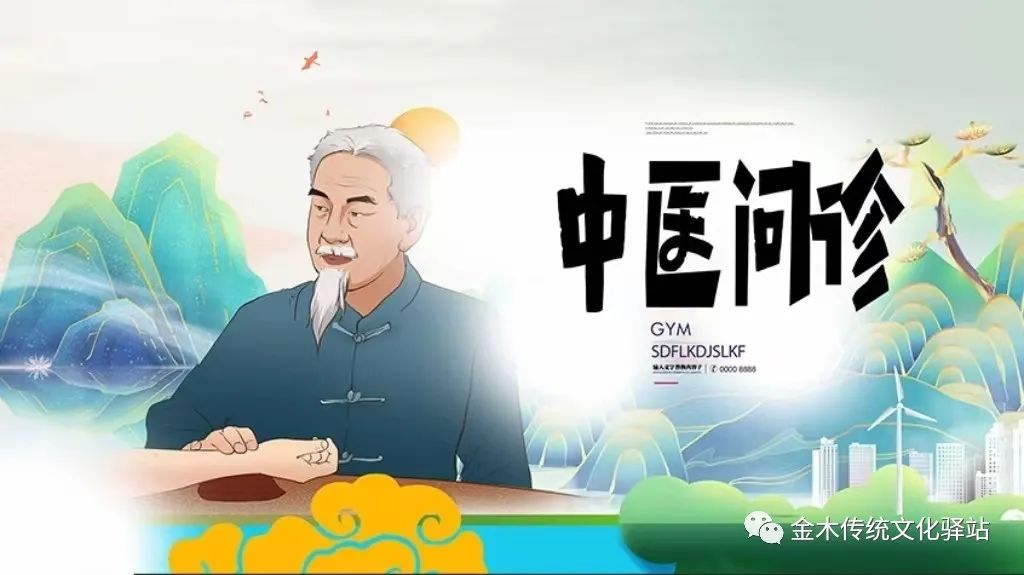
Ten Questions Song:First ask about cold and heat, second ask about sweating,Third ask about head and body, fourth ask about bowel movements.Fifth ask about diet, sixth ask about chest, seventh about deafness, eighth about thirst.Ninth ask about old diseases, tenth ask about causes,Then refer to the diagnosis and treatment process.Personal and family history should be thoroughly asked, women’s menstrual and childbirth history.Children’s infectious vaccination history, history of childhood diseases, dietary preferences.1. Significance
2. Methods
3. Precautions
1. Comprehensive, careful, and patient
2. Good medical ethics, communication skills
3. Remember to use some professional terminology
4. Avoid leading questions
5. Emergency cases
(1) Ask about cold and heat
Cold: fear of cold
Chills — adding clothes and blankets, warming by the fire does not relieve, short duration, exterior syndrome
Aversion to cold — adding clothes and blankets relieves, interior syndrome
Cold body and limbs
Heat: fever (elevated body temperature, patient feels hot)
Presence or absence, whether it appears simultaneously, severity, duration.
1.1 Chills and fever, appearing together.
See exterior syndrome, for every bit of cold and heat, there is a corresponding exterior syndrome.
Exterior syndrome: cold and heat, deficiency and excess
-
Exterior cold syndrome: heavy cold, light heat, no sweat, head and body pain, pulse floating and tight
-
Exterior heat syndrome: heavy heat, light cold, sweating, sore throat, pulse floating and rapid
-
Exterior deficiency syndrome: aversion to wind and fever, sweating, pulse floating and slow
1.2 Only cold, not heat
New illness with aversion to cold — 【Interior excess cold syndrome】
Chronic illness with aversion to cold — 【Interior deficiency cold syndrome】 yang deficiency
1.3 Only heat, not cold
Fever
1.3-1 High fever, severe fever, major heat — key points for judgment, elevated temperature, body feels hot to the touch. Above 39 degrees Celsius. Aversion to heat. 【Interior excess heat syndrome】
1.3-2 Tidal fever, periodic fever, periodic heat surge
-
Yangming tidal fever — gastrointestinal heat accumulation, yangming bowel excess syndrome, tidal fever at specific times (Shen time), fullness and dryness.
-
Yin deficiency tidal fever — heat in the afternoon and night, accompanied by five hearts heat, flushed cheeks, night sweats. Pulse thin and rapid.
-
Damp-heat tidal fever — damp-heat syndrome, worse heat in the afternoon, body heat not rising, aversion to food and nausea, heavy body, tongue red with yellow coating.
1.3-3 Mild fever below 38 degrees, feeling hot all over
-
Yin deficiency fever
-
Qi deficiency fever 【Bu Zhong Yi Qi Tang, treats qi deficiency fever】
-
Qi stagnation fever 【Stagnation generates fire】
-
Childhood summer heat
1.4 Alternating cold and heat
Cold and heat appear alternately 【Half exterior half interior syndrome, Shaoyang disease】 malaria.
(2) Ask about sweating
Yang added to yin is called sweat
Visible sweating
Ask about presence/absence, color, quality, time, quantity, location, accompanying symptoms
2.1 Presence or absence of sweat
No sweat:
No heat — not a heat syndrome (cold, yang deficiency)
No water — fluid deficiency, blood deficiency 【Those who lose blood do not sweat】
Presence of sweat
With heat — heat syndrome (excess heat, deficiency heat)
Pores not secure — qi deficiency (qi cannot secure — like a loose faucet, Ying and Wei not harmonized, exterior deficiency syndrome — like a broken faucet)
Special sweating
Spontaneous sweating: sweating while awake, worsens with movement 【qi deficiency, yang deficiency】
Night sweats: sweating during sleep, stops upon waking, yin deficiency with internal heat
Battle sweat: first shivering then sweating, improvement: heat recedes, pulse calms and body cools; worsening: agitation and rapid pulse
Absolute sweat: critical condition, profuse sweating. Loss of yin/loss of yang. Loss of yin: sweating like oil, salty taste; loss of yang: profuse sweating, tasteless, cold limbs.
Localized sweatingoccurs
Head sweating: upper jiao heat excess/middle jiao damp-heat/yin cold internally excessive
Half-body sweating: meridian obstruction 【wind pathogen, damp pathogen】
Palmar-plantar sweating: often seen in heat syndrome 【deficiency heat syndrome/damp-heat syndrome/excess heat syndrome】
Chest sweating: deficiency syndrome
Yellow sweat, like cypress juice — damp-heat
Yu Ping Feng San: treats deficiency syndrome, stops sweating and secures the exterior 【Fang Feng + Bai Zhu + Huang Qi, can add Long Gu, Mu Li, Fu Xiao Mai】;
Gui Zhi Tang: for colds, suitable for exterior cold syndrome.
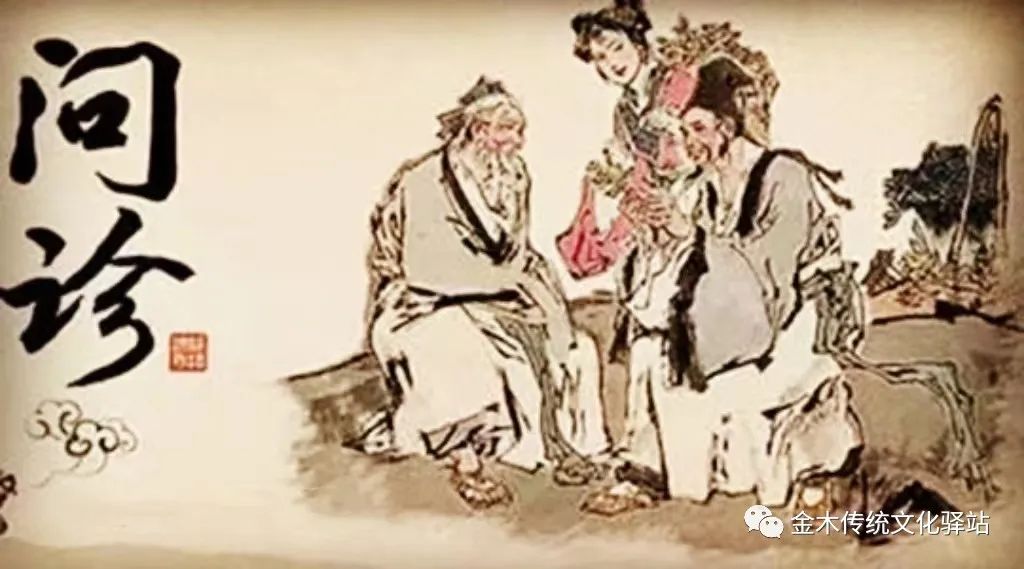
(3) Ask about pain
Without flow, there is pain; without nourishment (Ying), there is pain.
Inquire about the nature of pain, locationnature of pain.
1. Distending pain, location variable, emotional fluctuations can worsen, belching can relieve 【Qi stagnation manifestation, functional】
2. Stabbing pain, pain like needle pricks, fixed location, worse at night 【Blood stasis manifestation, organic】
3. Cold pain, pain with a cold sensation
4. Burning pain, sensation of burning pain
5. Pain with pressure, severe pain, excess syndrome
6. Pain with relief from pressure, deficiency syndrome
7. Wandering pain, pain that moves around, in limbs and joints 【Wind syndrome, migratory rheumatism】
8. Heavy pain, with a feeling of heaviness 【Damp syndrome】
Location of painanddisease location
1. Headache
-
Headache with neck pain — Taiyang meridian
-
Headache on both sides — Shaoyang meridian
-
Frontal headache, brow bone — Yangming meridian
-
Top of the head — Jueyin meridian
2. Chest pain — heart and lungs
3. Hypochondriac pain — liver and gallbladder
4. Epigastric pain — stomach
5. Abdominal pain — spleen, stomach, intestines
6. Lower abdominal pain — bladder, uterus
7. Lower abdomen pain — liver and gallbladder
8. Lumbar pain — kidney 【The lumbar region is the residence of the kidneys】
(4) Ask about discomfort in head, body, chest, and abdomen
1. Dizziness, feeling of dizziness in the head
2. Chest tightness, feeling of oppression
3. Palpitations, feeling of heart agitation,startled palpitations, due to frightanxiety, severe heartbeat, from heart to abdomen.
4. Hypochondriac distension, related to liver and gallbladder
5. Epigastric fullness, stomach pain
6. Abdominal distension
7. Heaviness of body, feeling of heaviness 【Water dampness flooding/qi deficiency and weakness】
8. Itching, skin itching 【Wind is the main cause of itching, external wind pathogens/blood deficiency generating wind/damp-heat】
9. Numbness, skin or tendons lacking nourishment
10. Cramping, spasms, difficulty in flexion and extension.
11. Fatigue
(5) Ask about ears and eyes
The kidneys open to the ears, the liver opens to the eyes
1. Ask about ears
Heavy hearing, deafness — liver fire rising 【Long Dan Cao San】;
Gradual deafness — kidney deficiency
Tinnitus — tinnitus like waves, like thunder, often seen in excess syndrome; tinnitus like cicadas, deficiency syndrome
2. Ask about eyes
Eye itching — wind pathogen, blood deficiency
Eye pain — stabbing pain, foreign body sensation
Eye dizziness, blurred vision — spinning and swaying, like being on a boat
Dim vision — liver and kidney deficiency, essence and blood loss
(6) Ask about sleep
Duration/quality of sleep/quality/dreams/waking up
Insomnia: related to the heart, blood deficiency/yin deficiency. Heart lacks nourishment, heart spirit is unsettled; phlegm-fire internally disturbing
-
Difficulty falling asleep: heart
-
Waking up early: kidney issues
-
Nightmares: liver issues, liver stores the soul
-
Worry: spleen
-
Restlessness: lung
Excessive sleepiness
Phlegm-damp:
-
Phlegm-damp obstructing, clear yang not rising
-
Fatigue and low energy, insufficient qi
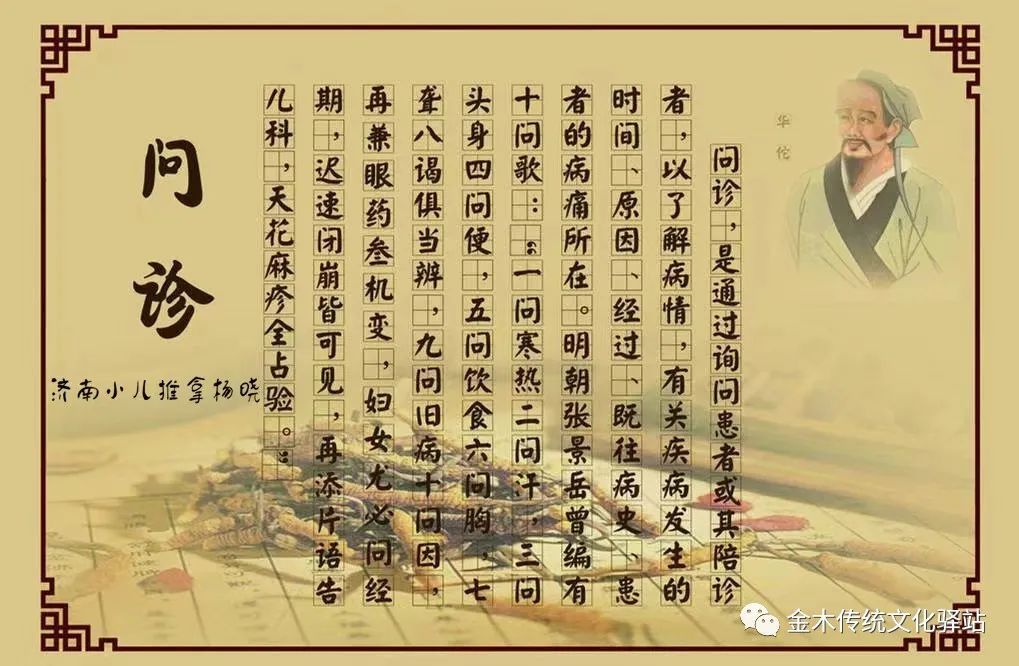
(7) Ask about diet and taste
Ask about thirst and drinking (presence/absence/preference for hot or cold)
No thirst — has water, no heat 【cold syndrome, damp syndrome】
Thirst — no water, fluid injury; blockage, transport obstruction.
Special — preference for hot drinks, cold syndrome; water enters and immediately vomits, water reversal, drinking stops internally; rinsing water without drinking, blood stasis syndrome.
Ask about appetite and food intake
1. Decreased appetite: abnormal spleen and stomach function
No desire to eat
Reduced intake
Indigestion
Food aversion
2. Excessive appetite: stomach fire is excessive
+weight loss: thirst
+loose stools: strong stomach, spleen heat
3. Hunger without desire to eat: stomach yin deficiency
4. Food preferences
-
Fatty and sweet: phlegm-damp
-
Raw and cold: injures spleen yang
-
Spicy: causes dryness and heat
Ask about taste
-
Faint taste: spleen and stomach qi deficiency, cold syndrome
-
Bitter taste: heat, liver and gallbladder fire excess
-
Sweet taste: spleen and stomach damp-heat
-
Sour taste: indigestion
-
Sticky taste: damp obstructing the middle jiao
(8) Ask about urination and defecation
(1) Ask about bowel movements
Abnormal bowel frequency
1. Constipation:
-
Heat — Yangming bowel excess syndrome
-
Cold — cold, yang deficiency
-
Deficiency — fluid deficiency; blood deficiency; yang qi deficiency
2. Diarrhea: watery, urgent feeling
Loose stools: unformed, mushy 【Spleen deficiency with dampness】
Early morning diarrhea: spleen and kidney yang deficiency
Abnormal stool quality
Undigested food: spleen and kidney yang deficiency
Loose stools not regulated: liver and spleen disharmony
Pus and blood in stool: dysentery, red and white
Blood in stool: distant blood 【Spleen qi not securing blood】; near blood 【Large intestine damp-heat】
Abnormal defecation sensation
Urgency with heaviness
(2) Ask about urination
Abnormal urine volume
Increased volume: deficiency syndrome, cold syndrome, thirst
Decreased volume: heat, fluid injury, edema
Abnormal urination frequency
Frequent urination: damp-heat descending
Nighttime frequency: kidney qi not secure
Urinary retention: qi deficiency and weakness; obstruction
Abnormal urination sensation
Post-dribbling: kidney qi not secure, kidney yang deficiency
Incontinence: kidney qi deficiency, bladder loss of control
Enuresis: kidney qi not secure, insufficient kidney qi (children), kidney qi deficiency (elderly)
(9) Ask about menstruation and leukorrhea
(1) Ask about menstruation
Early, excessive, flooding — bleeding 【heat; qi deficiency; blood stasis obstruction, blood not following the meridians】
Late, insufficient, short cycle —cold coagulation, qi stagnation, blood deficiency, phlegm obstruction
(2) Ask about leukorrhea
(10) Ask about children
Birth, feeding, development, medical history, causes.
Spread TCM health knowledge, promote Chinese traditional culture,share health concepts, convey care, passing health knowledge and traditional culture to more friends……
People are great because of dreams; we are different because of love.
Liu Qing Ning: 186 9643 6785 or (WeChat ID)
Yang Shun Song: 138 7171 7447 or (WeChat ID)


